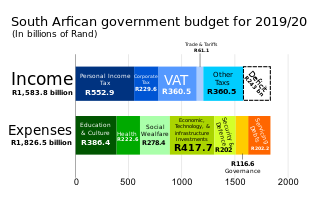An income tax is a tax imposed on individuals or entities (taxpayers) in respect of the income or profits earned by them. Income tax generally is computed as the product of a tax rate times the taxable income. Taxation rates may vary by type or characteristics of the taxpayer and the type of income.
Tax deduction is a simplified phrase for meaning income that is able to be taxed and is commonly a result of expenses, particularly those incurred to produce additional income. Tax deductions are a form of tax incentives, along with exemptions and tax credits. The difference between deductions, exemptions, and credits is that deductions and exemptions both reduce taxable income, while credits reduce tax.
Capital gain is an economic concept defined as the profit earned on the sale of an asset which has increased in value over the holding period. An asset may include tangible property, a car, a business, or intangible property such as shares.
A capital gains tax (CGT) is the tax on profits realized on the sale of a non-inventory asset. The most common capital gains are realized from the sale of stocks, bonds, precious metals, real estate, and property.

In the United Kingdom, taxation may involve payments to at least three different levels of government: central government, devolved governments and local government. Central government revenues come primarily from income tax, National Insurance contributions, value added tax, corporation tax and fuel duty. Local government revenues come primarily from grants from central government funds, business rates in England, Council Tax and increasingly from fees and charges such as those for on-street parking. In the fiscal year 2014–15, total government revenue was forecast to be £648 billion, or 37.7 per cent of GDP, with net taxes and National Insurance contributions standing at £606 billion.
The Enterprise Investment Scheme (EIS) is a series of UK tax reliefs launched in 1994 in succession to the Business Expansion Scheme. It is designed to encourage investments in small unquoted companies carrying on a qualifying trade in the United Kingdom.
The schedular system of taxation is the system of how the charge to United Kingdom corporation tax is applied. It also applied to United Kingdom income tax before legislation was rewritten by the Tax Law Rewrite Project. Similar systems apply in other jurisdictions that are or were closely related to the United Kingdom, such as Ireland and Jersey.

Taxation in Ireland in 2017 came from Personal Income taxes, and Consumption taxes, being VAT and Excise and Customs duties. Corporation taxes represents most of the balance, but Ireland's Corporate Tax System (CT) is a central part of Ireland's economic model. Ireland summarises its taxation policy using the OECD's Hierarchy of Taxes pyramid, which emphasises high corporate tax rates as the most harmful types of taxes where economic growth is the objective. The balance of Ireland's taxes are Property taxes and Capital taxes.
A self-invested personal pension (SIPP) is the name given to the type of UK government-approved personal pension scheme which allows individuals to make their own investment decisions from the full range of investments approved by HM Revenue and Customs (HMRC).
In France, taxation is determined by the yearly budget vote by the French Parliament, which determines which kinds of taxes can be levied and which rates can be applied.
Income tax in Australia is imposed by the federal government on the taxable income of individuals and corporations. State governments have not imposed income taxes since World War II. On individuals, income tax is levied at progressive rates, and at one of two rates for corporations. The income of partnerships and trusts is not taxed directly, but is taxed on its distribution to the partners or beneficiaries. Income tax is the most important source of revenue for government within the Australian taxation system. Income tax is collected on behalf of the federal government by the Australian Taxation Office.
Capital gains tax (CGT), in the context of the Australian taxation system, is a tax applied to the capital gain made on the disposal of any asset, with a number of specific exemptions, the most significant one being the family home. Rollover provisions apply to some disposals, one of the most significant of which are transfers to beneficiaries on death, so that the CGT is not a quasi estate tax.
In the United States, individuals and corporations pay a tax on the net total of all their capital gains. The tax rate depends on both the investor's tax bracket and the amount of time the investment was held. Short-term capital gains are taxed at the investor's ordinary income tax rate and are defined as investments held for a year or less before being sold. Long-term capital gains, on dispositions of assets held for more than one year, are taxed at a lower rate.
Capital allowances is the practice of allowing tax payers to get tax relief on capital expenditure by allowing it to be deducted against their annual taxable income. Generally, expenditure qualifying for capital allowances will be incurred on specified capital assets, with the deduction available normally spread over many years. The term is used in the UK and in Ireland.
In the United Kingdom, entrepreneurs selling their business can claim Business Asset Disposal Relief. This is a lifetime allowance of £1 million of gain that will be subject to Capital Gains Tax (CGT) at a reduced rate of 10%.

The June 2010 United Kingdom Budget, officially also known as Responsibility, freedom, fairness: a five-year plan to re-build the economy, was delivered by George Osborne, Chancellor of the Exchequer, to the House of Commons in his budget speech that commenced at 12.33pm on Tuesday, 22 June 2010. It was the first budget of the Conservative-Liberal Democrat coalition formed after the general election of May 2010. The government dubbed it an "emergency budget", and stated that its purpose was to reduce the national debt accumulated under the Labour government.

Taxation may involve payments to a minimum of two different levels of government: central government through SARS or to local government. Prior to 2001 the South African tax system was "source-based", where in income is taxed in the country where it originates. Since January 2001, the tax system was changed to "residence-based" wherein taxpayers residing in South Africa are taxed on their income irrespective of its source. Non residents are only subject to domestic taxes.
Taxation in Gibraltar is determined by the law of Gibraltar which is based on English law, but is separate from the UK legal system. Companies and non residents do not pay income tax unless the source of this income is or is deemed to be Gibraltar. Individuals pay tax on a worldwide basis on income from employment or self employment if they are ordinarily resident in Gibraltar. There is no tax on capital income.

The October 2021 United Kingdom budget, officially known as the Autumn Budget and Spending Review 2021. A Stronger Economy for the British People, was a budget statement made by Chancellor of the Exchequer Rishi Sunak on 27 October 2021. It was the third and final consecutive budget delivered by Sunak before his resignation in July 2022.

The 1988 United Kingdom budget was delivered by Nigel Lawson, the Chancellor of the Exchequer, to the House of Commons on 15 March 1988. It was the fifth budget to be delivered by Lawson during his tenure as Chancellor, and marked major changes to taxation, with reductions in income tax and changes to inheritance tax rules, as well as changes to mortgage interest relief that prevented homebuyers from being able to pool mortgage allowances. The changes announced to mortgage relief ultimately helped to further fuel an ongoing property boom which led to a rise in inflation and an increase in interest rates. Due to frequent disruptions during the Chancellor's speech, Deputy Speaker Harold Walker was required to suspend proceedings in what was described as an outbreak of "grave disorder".





